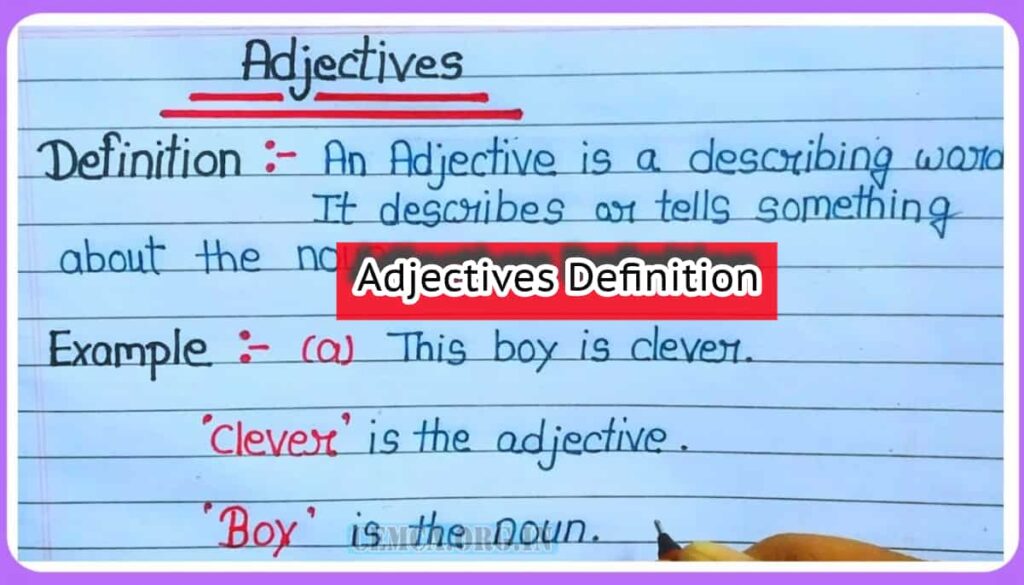Adjectives Definition – An adjective is a portion of speech that can utilized to explain or give more detail regarding a noun or pronoun that acts as the subject in a sentence. Adjectives are found after the verb or before the noun it alters.
Adjectives Definition
Contents
As per the Cambridge Dictionary, an adjective is reform as “a word that narrate a noun or pronoun.” The Collins Dictionary provides a more elaborate definition. In accordance with it, “an adjective is a word like ‘big’, ‘ dead’, or ‘ financial’ that narrates a person or thing, or offers additional detail about them. Adjectives normally come before nouns or after link verbs.”
The Oxford Learner’s Dictionary defines an adjective as “a word that narrate a person or thing, for instance ‘big’, ‘red’ & ‘clever’ in a big house, red wine & a clever idea.” An adjective is “a word belonging to one of the main form classes in any of various languages & typically working for as a modifier of a noun to indicate a quality of the thing named, to hint its quantity or extent, or to particular a thing as clear from something else”, as per the Merriam-Webster Dictionary.

Adjectives Definition Overview
| Article For | Adjectives Definition |
| Category | Trending |
Read Also – Verb Forms in English
Types of Adjectives
Adjectives can be split into various class based on their purpose when utilized in a sentence. The many kinds of adjectives are:
- Possessive Adjectives
- Interrogative Adjectives
- Demonstrative Adjectives
- Compound Adjectives
Possessive Adjectives
These adjectives, such as possessive pronouns, are utilizing to show or speak for possession of a quality. For sample: my, your, his, her, their, its, whose, etc.
Interrogative Adjectives
An adjective that is utilizing to alter a noun or a pronoun by asking a question is calling an interrogative adjective. There’re only a few adjectives that can term as interrogative adjectives. They’re whose, what & which.
Demonstrative Adjectives
Demonstrative adjectives are majorly utilized to narrate the position of a subject (a noun or pronoun) in space or time.
Compound Adjectives
Compound adjectives incorporate of 2 or more adjectives that are combined together to form an adjective that can used to alter the subject.
Read Also – Fastag KYC Update
Forms of Adjectives – Degrees of Comparison
Did you know that adjectives can utilized to contrast similar qualities of many subjects that perform the same action. There’re 3 forms of adjectives or rather 3 degrees of comparison. They’re:
- Positive or Absolute Form
- Comparative Form
- Superlative Form
Positive Degree of Comparison
The positive form or the positive degree of collation is the form of the adjective utilizing in the original form. For sample: This book is interesting. This form of adjective is utilizing when there is no other subject to compare.
Comparative Degree of Comparison
The comparative form of the adjective is utilizing when 2 subjects execute the same action or own the same quality are compared.
Superlative Degree of Comparison
The superlative degree of contrast is utilizing when comparing the same quality of 2 or more subjects & to speak for that a subject is superior to 2 or more subjects in performing an action. For sample: This fantasy novel is the most interesting book that I have ever read.
Read Also – Pakistan New PM
List of Adjectives
The following is the list of adjectives :
Beautiful, sleeveless, edible, meaningless, beautiful, adorable, gorgeous, breakable, homeless, big, old, green, antique, more intelligent, prettiest, worse, aggressive. Agreeable, ambitious, brave, calm, delightful, eager, faithful, glamorous, gorgeous, handsome, long, magnificent, muscular, plain, plump, quaint, scruffy, shapely, short, skinny, stocky, ugly, unkempt, unsightly etc.
Examples of Adjectives
The following are the sample of Adjective :
1. He wore a beautiful suit.
2. A wooden car.
3. I like that really big, old, green antique bike that is parked here.
4. Ashwani is taller than Barsha.
5. Rohit is a part-time worker.
How To Identify Adjectives in a Sentence?
The following are the methods by which you can identify the adjectives in a sentence.
1. Look for a term that describes a noun preceding it.
2. Look for terms that describe a noun and come after it.
3. Verify any adjectives that follow a verb.
4. Watch out for comparison-making adjectives in your phrases.
5. Keep an eye out for common adjective suffixes like -ful, -ish, -able, -some, -ous, -al, -ic, -less.
Read Also – Largest State in India
How to Use Adjectives in Sentences?
Adjectives are popular to offer your writing & speech a very flowery look. It aids in making it descriptive & as well in offering your readers a visual treat. But, filling it with as well many adjectives can create it look or sound vague & unclear. This would only lead to mistake of your content. Knowing when, where & how to utilize adjectives is a skill that you should master.
Any piece of writing ought to clear & exact. Search if there is a word that especially means whatever you’re trying to carry. For sample: quick, swift, hasty, fleet, etc. are all adjectives that mean ‘very fast’. Likewise, contented, cheerful, merry, joyful, ecstatic, delighted, etc. are all words that narrate various degrees of happiness. There is as well another idea that you should know. There is a specific order in which you should place adjectives when you’re utilizing 2 or more adjectives to narrate the same subject or object.
Also Read –
Bageshwar Dham Token Booking Online
Frequently Asked Questions
Give some examples of adjectives.
Happy, depressed, hardworking, successful, skilled, sloppy, green, tampered, dilapidated, fixed, healthy, etc. are some examples of adjectives.
What is an adjective?
An adjective is a part of speech that can be used to describe or provide more information about the noun or pronoun that acts as the subject in a sentence. Adjectives are found after the verb or before the noun it modifies.
What can adjectives modify?
Adjectives modify Nouns and Pronouns.